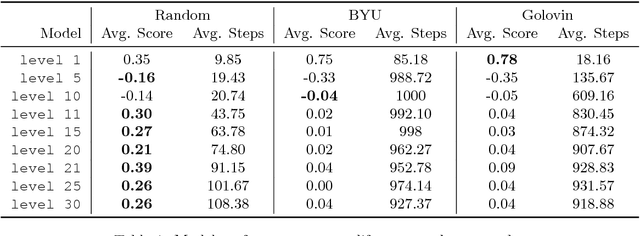Ben Kybartas
Tension Space Analysis for Emergent Narrative
Apr 22, 2020



Abstract:Emergent narratives provide a unique and compelling approach to interactive storytelling through simulation, and have applications in games, narrative generation, and virtual agents. However the inherent complexity of simulation makes understanding the expressive potential of emergent narratives difficult, particularly at the design phase of development. In this paper, we present a novel approach to emergent narrative using the narratological theory of possible worlds and demonstrate how the design of works in such a system can be understood through a formal means of analysis inspired by expressive range analysis. Lastly, we propose a novel way through which content may be authored for the emergent narrative system using a sketch-based interface.
TextWorld: A Learning Environment for Text-based Games
Jun 29, 2018



Abstract:We introduce TextWorld, a sandbox learning environment for the training and evaluation of RL agents on text-based games. TextWorld is a Python library that handles interactive play-through of text games, as well as backend functions like state tracking and reward assignment. It comes with a curated list of games whose features and challenges we have analyzed. More significantly, it enables users to handcraft or automatically generate new games. Its generative mechanisms give precise control over the difficulty, scope, and language of constructed games, and can be used to relax challenges inherent to commercial text games like partial observability and sparse rewards. By generating sets of varied but similar games, TextWorld can also be used to study generalization and transfer learning. We cast text-based games in the Reinforcement Learning formalism, use our framework to develop a set of benchmark games, and evaluate several baseline agents on this set and the curated list.
 Add to Chrome
Add to Chrome Add to Firefox
Add to Firefox Add to Edge
Add to Edge